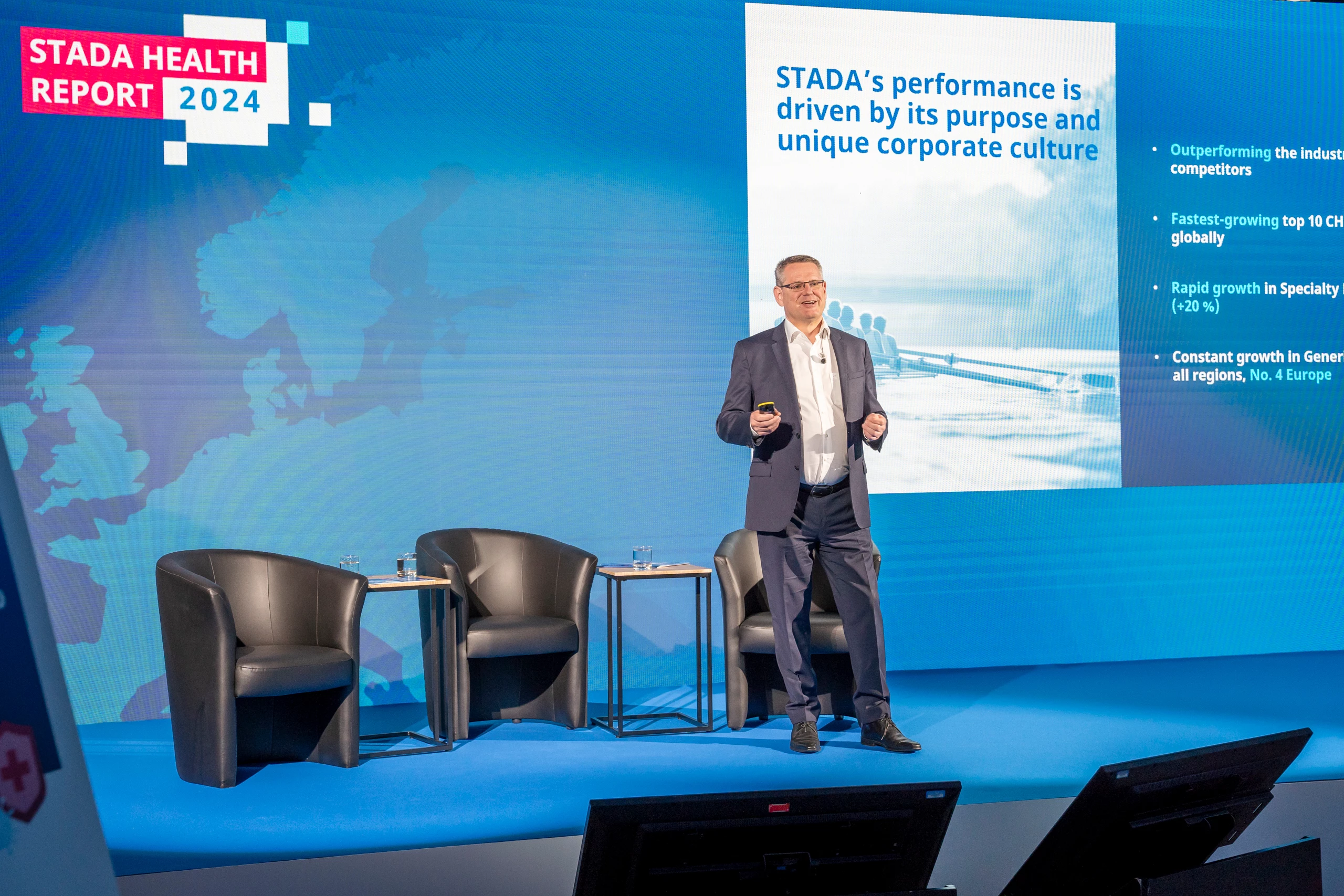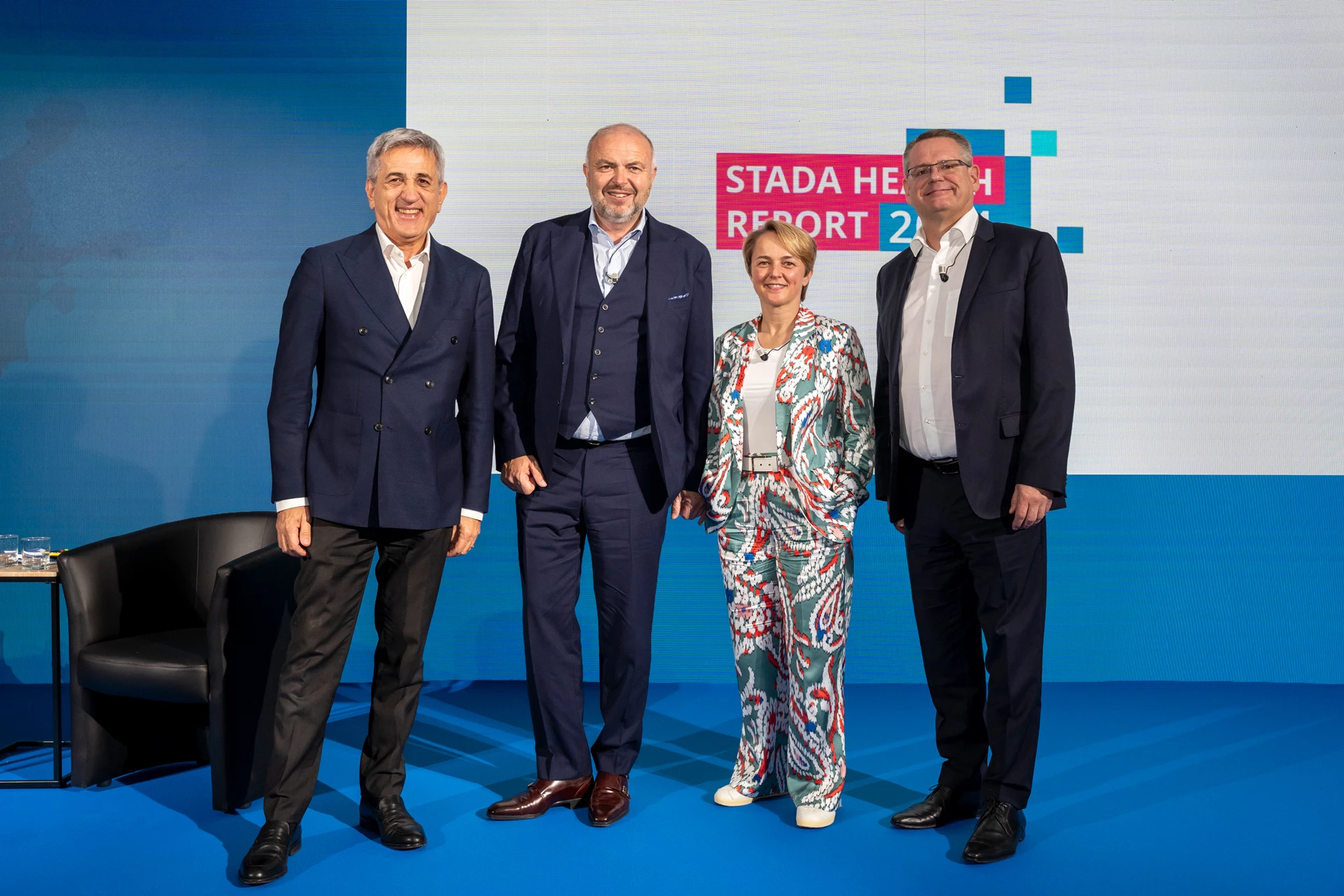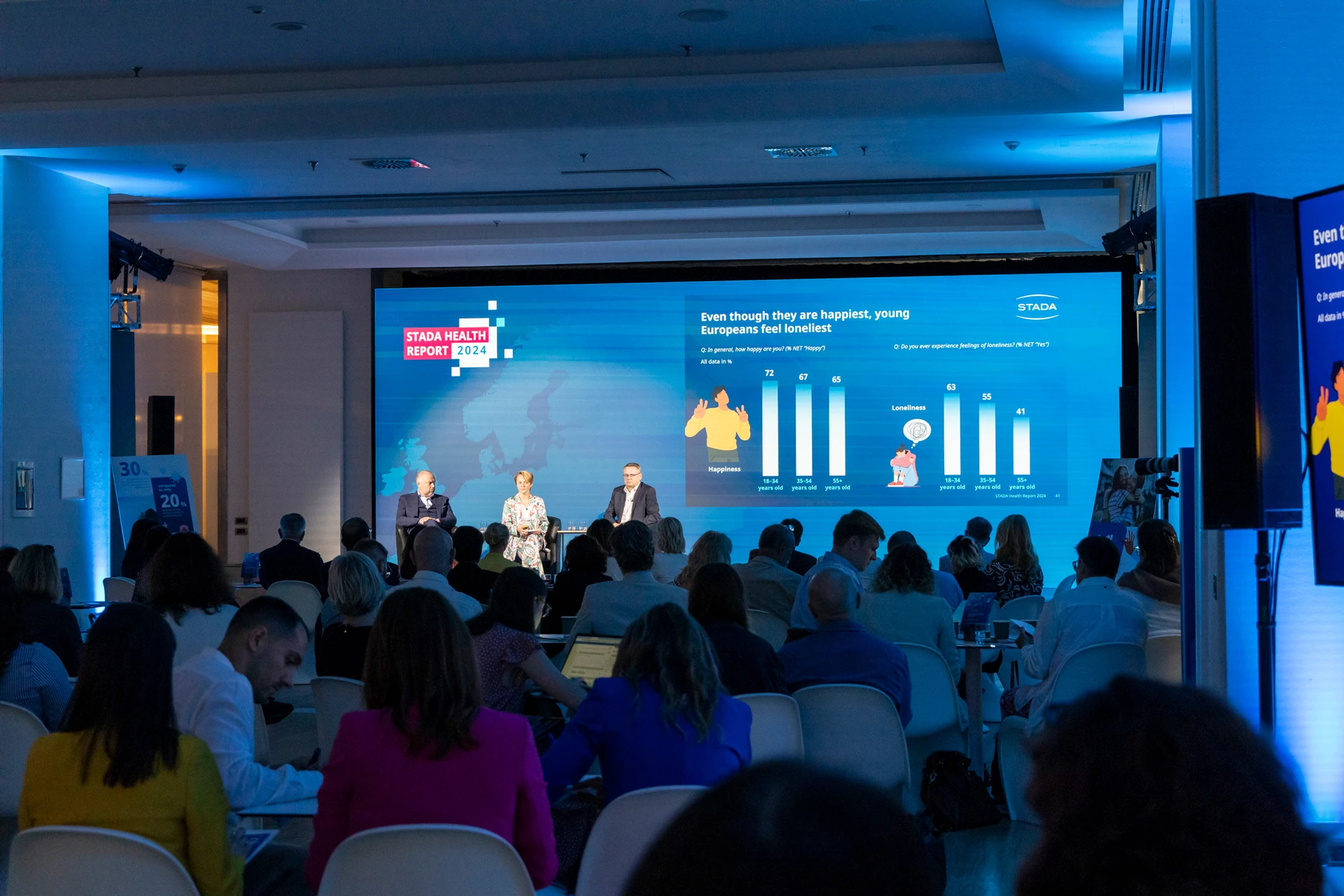Select your country
Websites worldwide
Select a country to go to the website of the respective STADA sales company.
Australia (1)
Austria (1)
Belarus (1)
Belgium (1)
Bosnia-Herzegovina (1)
Bulgaria (1)
China (1)
Croatia (1)
Czech Republic (2)
Denmark (1)
France (1)
Hungary (1)
Ireland (1)
Italy (1)
Montenegro (1)
Netherlands (2)
Poland (1)
Portugal (1)
Romania (1)
Saudi Arabia (1)
Serbia (1)
Slovakia (1)
Slovenia (1)
Spain (1)
Switzerland (1)
Thailand (1)
The Phillippines (1)
United Kingdom (3)
Vietnam (2)
- 24/06/2024
-
STADA Health Report 2024: Satisfaction with healthcare systems continues to decline – while individuals are caring more for their health
- STADA Health Report 2024: representative survey of around 46,000 respondents in 23 European countries shows that the healthcare system no longer adequately addresses the needs of many Europeans, causing them to take charge of their own health.
- Evaluation of healthcare systems falls for fourth year in a row; trust in conventional healthcare is on the up; self-reported mental health of Europeans decreases
- "With the STADA Health Report 2024, the people of Europe have spoken once again: healthcare satisfaction has decreased for the fourth year in a row – an alarming trend that we, together with policy-makers, regulators, doctors and pharmacists, need to understand, address and reverse. At the same time, it is encouraging to see people of all genders, backgrounds and age groups stepping up and taking care of their health – both physically and mentally,” says Peter Goldschmidt, CEO of STADA.
Bad Vilbel, 24 June 2024 – Healthcare systems are in need of an overhaul – such is the verdict of the European public. At 56 percent, satisfaction with healthcare systems has dropped to an all-time low, which many are taking as an invitation to step up: regular exercise, a healthy diet and activities to support mental wellbeing are some of the measures they have adopted to compensate for systemic weaknesses and to look after themselves.
Europe’s mental health has also taken a turn for the worse, with people rating their mental health slightly lower than in 2023. And although 67 percent of Europeans are happy in general, 52 percent – and particularly the younger generation – are struggling with loneliness.
With its 10th anniversary edition, the STADA Health Report ventures beyond identifying trends in Europeans’ thoughts and worries about all things health, to also offer actionable solutions for problem areas.
STADA Health Report:
Representative online study by Human8 on behalf of STADA.
Research time frame: February through March, 2024.
Sample: Around 2,000 respondents each from Austria, Belgium, Bulgaria, the Czech Republic, Denmark, Finland, France, Germany, Hungary, Ireland, Italy, Kazakhstan, the Netherlands, Poland, Portugal, Romania, Serbia, Slovakia, Spain, Sweden, Switzerland, the United Kingdom and Uzbekistan.
Satisfaction with healthcare falls to new low
Access to medical appointments, the standard of healthcare services, staff shortages and a general distrust of policy-makers in the healthcare sector – these are the main causes for dissatisfaction with healthcare systems. Now at 56 percent, satisfaction has decreased by 18 percentage points since 2020. People from first-time participant Hungary are the most dissatisfied with their healthcare system: 72 percent of them find it insufficient, followed by Kazakhstan (67) and Serbia (65). In comparison to 2023, the UK (-11 percentage points), Kazakhstan (-10 percentage points), and Germany (-8 percentage points) recorded the most significant declines.
Amid their complaints, Europeans have some big-picture ideas to improve satisfaction: almost 1 in 2 Europeans (48) believe it would make a difference if health policy-makers had a health-related background, and a similar proportion (47) call for increased wages for those working in medical professions to motivate more people to pursue a career in healthcare, thereby alleviating some of the pressure currently felt in the system.
Doctors and pharmacists “know what’s best”
Although discontent with healthcare is tangible, trust in conventional medicine has increased significantly. Almost 7 in 10 Europeans (69) say that they trust conventional medicine largely or fully – an increase by 7 percentage points compared to 2022. Finland (84) and Spain (82) are its most loyal proponents; and European men (73) are more likely to trust conventional medicine than women (65). The main driver for trust in conventional medicine? Much-cherished advice of healthcare professionals such as doctors and pharmacists, which is invaluable to 48 percent of Europeans. Such expert advice is particularly prized in Belgium and Ireland (both 56), Germany and the Netherlands (both 55), and Denmark and the UK (both 53).
Amid systemic dissatisfaction, Europeans are looking after their own health
With satisfaction levels dropping, more and more Europeans are taking matters into their own hands: 89 percent of them do at least one thing to improve their overall wellbeing. In Finland (66), Spain (62) and Italy (60), people are more physically active than average (50). Furthermore, one third attends preventive health check-ups (33) or takes dietary supplements (32). Interestingly, 31 percent of Europeans also regard time spent with loved ones as an investment in their overall wellbeing.
Young Europeans struggle with loneliness
Although the majority of Europeans state that they are “quite” or “very happy” (67), there is still cause for concern: while self-assessed mental health has declined only slightly from 67 percent in 2023 to 65 percent of Europeans rating their mental health as “good” or “very good”, a closer look reveals a phenomenon that should not be underestimated. The loneliness epidemic has well and truly seized the continent, with 52 percent experiencing feelings of loneliness. And although they are more connected than any other group, 63 percent of 18 to 34-year-olds feel lonely. However, excessive time spent online is only part of the problem: first and foremost, the young generation cite work (27) as the main driver for loneliness and consequently call for better work-life-balance to remedy the situation.







About STADA Arzneimittel AG
STADA Arzneimittel AG is headquartered in Bad Vilbel, Germany. The company focuses on a three-pillar strategy consisting of consumer healthcare products, generics and specialty pharma. Worldwide, STADA Arzneimittel AG sells its products in approximately 115 countries. In financial year 2023, STADA achieved group sales of EUR 3,735 million and reported earnings before interest, taxes, depreciation and amortization (EBITDA) of EUR 802 million. As of 31 December 2023, STADA employed 11,667 people worldwide.
Additional information for journalists
STADA Arzneimittel AG - Media Relations
Stadastrasse 2-18
61118 Bad Vilbel - Germany
Phone: +49 (0) 6101 603-165
Fax: +49 (0) 6101 603-215
E-Mail: [email protected]
Additional information for capital market participants
STADA Arzneimittel AG - Investor & Creditor Relations
Stadastrasse 2-18
61118 Bad Vilbel – Germany
Phone: +49 (0) 6101 603-4689
Fax: +49 (0) 6101 603-215
E-mail: [email protected]





